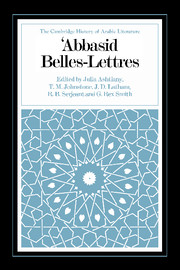Book contents
- Frontmatter
- The ʿAbbasid Caliphate: a historical introduction
- 1 Adab and the concept of belles-lettres
- 2 Shuʿūbiyyah in Arabic literature
- 3 Ibn al-Muqaffaʿ and early ʿAbbasid prose
- 4 Al-Jāḥiẓ
- 5 Al-Ṣaḥib Ibn ʿAbbād
- 6 Abū Ḥayyān al-Tawḥīdī
- 7 Al-Hamadhānī, al-Ḥarīrī and the maqāmāt genre
- 8 Fables and legends
- 9 ʿAbbasid poetry and its antecedents
- 10 Hunting poetry (ṭardiyjāt)
- 11 Political poetry
- 12 Love poetry (ghazal)
- 13 Wine poetry (khamriyyāt)
- 14 Mystical poetry
- 15 Ascetic poetry (zuhdiyyāt)
- 16 Bashshār b. Burd, Abū ʾl-ʿAtāhiyah and Abū Nuwās
- 17 Al-Mutanabbī
- 18 Abū Firās al-Ḥamdānī
- 19 Abū ʾl-ʿAlāʾ al-Maʿarrī
- 20 Literary criticism
- 21 Ibn al-Muʿtazz and Kitāb al-Badīʿ
- 22 Regional literature: Egypt
- 23 Regional literature: the Yemen
- Appendix: Table of metres
- Bibliography
- Index
16 - Bashshār b. Burd, Abū ʾl-ʿAtāhiyah and Abū Nuwās
Published online by Cambridge University Press: 28 May 2012
- Frontmatter
- The ʿAbbasid Caliphate: a historical introduction
- 1 Adab and the concept of belles-lettres
- 2 Shuʿūbiyyah in Arabic literature
- 3 Ibn al-Muqaffaʿ and early ʿAbbasid prose
- 4 Al-Jāḥiẓ
- 5 Al-Ṣaḥib Ibn ʿAbbād
- 6 Abū Ḥayyān al-Tawḥīdī
- 7 Al-Hamadhānī, al-Ḥarīrī and the maqāmāt genre
- 8 Fables and legends
- 9 ʿAbbasid poetry and its antecedents
- 10 Hunting poetry (ṭardiyjāt)
- 11 Political poetry
- 12 Love poetry (ghazal)
- 13 Wine poetry (khamriyyāt)
- 14 Mystical poetry
- 15 Ascetic poetry (zuhdiyyāt)
- 16 Bashshār b. Burd, Abū ʾl-ʿAtāhiyah and Abū Nuwās
- 17 Al-Mutanabbī
- 18 Abū Firās al-Ḥamdānī
- 19 Abū ʾl-ʿAlāʾ al-Maʿarrī
- 20 Literary criticism
- 21 Ibn al-Muʿtazz and Kitāb al-Badīʿ
- 22 Regional literature: Egypt
- 23 Regional literature: the Yemen
- Appendix: Table of metres
- Bibliography
- Index
Summary
Abū Muʿādh Bashshār b. Burd al-Muraʿʿath (c. 95-167/c. 714-83), Abū Isḥāq Ismāʿīl b. al-Qāsim, nicknamed Abū ʾl-ʿAtāhiyah (130-c. 210/748-c. 825) and al-Ḥasan b. Hāniʾ al-Ḥakamī, known as Abū Nuwās (c. 140-200/c. 757-815) are among the earliest and most important representatives of a group of poets whom medieval Arab critics describe as “moderns” (muḥdathūri). In this context, “modern” simply means that these poets belong to the “modern”, that is ʿAbbasid, period, or, to be precise, that their poetic activity falls mainly within this period. However, these three poets can be grouped together not only because they lived at much the same time, but also because they came from the same region and belonged to the same ethnic stock or to the same social class. All three were from Iraq or the neighbouring part of Persia: Bashshār from Basra, Abū ʾl-ʿAtāhiyah either from Kufa or ʿAyn al-Tamr, and Abū Nuwās from a village near Ahwāz. The first two passed the formative years of their lives in their native towns; Abū Nuwās spent his youth first in Basra, then in Kufa. All three poets were decisively influenced by the social and cultural life of Basra or Kufa respectively before they came into contact with the newly founded capital of the ʿAbbasid empire, Baghdad, and its court. Abū ʾl-ʿAtāhiyah and Abū Nuwās settled permanently in the new centre; it is not quite clear whether Bashshār did so too, although we often find him there, and for extended periods. Bashshār died near Basra, Abū ʾl-ʿAtāhiyah and Abū Nuwaās in Baghdad.
- Type
- Chapter
- Information
- Abbasid Belles Lettres , pp. 275 - 299Publisher: Cambridge University PressPrint publication year: 1990
- 1
- Cited by

